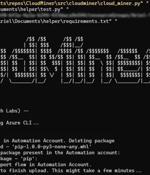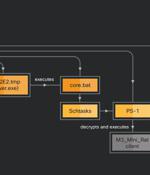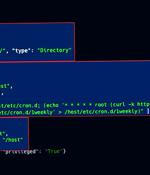Security News

Microsoft warns that financially-motivated threat actors are using OAuth applications to automate BEC and phishing attacks, push spam, and deploy VMs for cryptomining. Recent incidents investigated by Microsoft Threat Intelligence experts revealed that attackers mainly target user accounts that lack robust authentication mechanisms in phishing or password-spraying attacks, focusing on those with permissions to create or modify OAuth apps.

Cybersecurity researchers have developed what's the first fully undetectable cloud-based cryptocurrency miner leveraging the Microsoft Azure Automation service without racking up any charges. Developed by Microsoft, it's a cloud-based automation service that allows users to automate the creation, deployment, monitoring, and maintenance of resources in Azure.

In the active Elektra-Leak campaign, attackers hunt for Amazon IAM credentials within public GitHub repositories before using them for cryptomining. New research from Palo Alto Networks's Unit 42 exposes an active attack campaign in which a threat actor hunts for Amazon IAM credentials in real time in GitHub repositories and starts using them less than five minutes later.

A threat actor, presumably from Tunisia, has been linked to a new campaign targeting exposed Jupyter Notebooks in a two-fold attempt to illicitly mine cryptocurrency and breach cloud environments....

A legitimate Windows tool used for creating software packages called Advanced Installer is being abused by threat actors to drop cryptocurrency-mining malware on infected machines since at least November 2021. "The attacker uses Advanced Installer to package other legitimate software installers, such as Adobe Illustrator, Autodesk 3ds Max, and SketchUp Pro, with malicious scripts and uses Advanced Installer's Custom Actions feature to make the software installers execute the malicious scripts," Cisco Talos researcher Chetan Raghuprasad said in a technical report.

Cybercriminals are leveraging a legitimate Windows tool called 'Advanced Installer' to infect the computers of graphic designers with cryptocurrency miners. The attackers promote installers for popular 3D modeling and graphic design software such as Adobe Illustrator, Autodesk 3ds Max, and SketchUp Pro, likely through black hat search engine optimization techniques.

Json from CRED FILE NAMES file name array to GCLOUD CREDS FILES file name array[+] added netrc, kubeconfig, adc. Db from CRED FILE NAMES file name array[-] removed dload function[+] added commented dload function invocation for posting final results[+] added commented wget command to download and execute https://everlost.

Exposed Kubernetes clusters are being exploited by malicious actors to deploy cryptocurrency miners and other backdoors. Cloud security firm Aqua, in a report shared with The Hacker News, said a majority of the clusters belonged to small to medium-sized organizations, with a smaller subset tied to bigger companies, spanning financial, aerospace, automotive, industrial, and security sectors.

Misconfigured and poorly secured Apache Tomcat servers are being targeted as part of a new campaign designed to deliver the Mirai botnet malware and cryptocurrency miners. The findings come...

Poorly managed Linux SSH servers are getting compromised by unknown attackers and instructed to engage in DDoS attacks while simultaneously mining cryptocurrency in the background. "The source code of Tsunami is publicly available so it is used by a multitude of threat actors. Among its various uses, it is mostly used in attacks against IoT devices. Of course, it is also consistently used to target Linux servers," researchers with AhnLab's Security Emergency response Center explained.